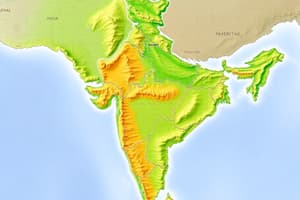Podcast
Questions and Answers
What does climate refer to?
What does climate refer to?
- The sum total of weather conditions over a large area for a long period of time (correct)
- The temperature and humidity of a place
- The state of the atmosphere over an area at any point of time
- The daily variations in weather conditions
Which of the following are elements of weather and climate?
Which of the following are elements of weather and climate?
- Temperature, atmospheric pressure, wind, humidity, and precipitation (correct)
- Cloud cover, air pollution, daylight hours, and visibility
- Altitude, latitude, longitude, and ocean currents
- Rainfall, snowfall, hail, and sleet
What is the difference between weather and climate?
What is the difference between weather and climate?
- Weather refers to the state of the atmosphere at any point of time, while climate refers to long-term weather patterns (correct)
- Weather is about temperature and humidity, while climate is about wind and precipitation
- Climate refers to daily variations in weather, while weather refers to long-term patterns
- Weather is predictable, while climate is unpredictable
What is the duration required to study climate?
What is the duration required to study climate?
What do temperature, atmospheric pressure, wind, humidity, and precipitation collectively represent?
What do temperature, atmospheric pressure, wind, humidity, and precipitation collectively represent?
Flashcards are hidden until you start studying
Study Notes
Understanding Climate
- Climate refers to the long-term patterns and averages of temperature, humidity, precipitation, and other atmospheric conditions in a specific region over an extended period, typically 30 years or longer.
Elements of Weather and Climate
- Key elements of weather and climate include temperature, atmospheric pressure, wind, humidity, and precipitation. These elements interact to define the overall condition of the atmosphere.
Distinction Between Weather and Climate
- Weather describes the short-term variations in atmospheric conditions, such as daily temperature and precipitation, while climate encompasses the long-term averages and trends of these elements over a defined period.
Duration for Climate Study
- The study of climate generally requires a duration of at least 30 years to establish reliable trends and averages that represent the typical conditions in a region.
Collective Representation
- Temperature, atmospheric pressure, wind, humidity, and precipitation collectively represent the principal components that define both weather and climate systems.
Studying That Suits You
Use AI to generate personalized quizzes and flashcards to suit your learning preferences.




